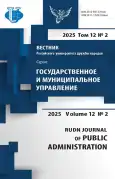Teaching English in the context of educational policies in the GCC countries
- Authors: Savvin I.A.1, Dubinina N.V.1
-
Affiliations:
- RUDN University
- Issue: Vol 12, No 2 (2025)
- Pages: 305-312
- Section: INTERNATIONAL EXPERIENCE OF PUBLIC ADMINISTRATION
- URL: https://journal-vniispk.ru/2312-8313/article/view/317850
- DOI: https://doi.org/10.22363/2312-8313-2025-12-2-305-312
- EDN: https://elibrary.ru/PPEVBQ
- ID: 317850
Cite item
Abstract
After the discovery of oil in the Gulf countries, the number of labor migrants in these countries, mainly from South and Southeast Asia, as well as Africa, increased sharply. This led to the strengthening of the role of English as the language of intercultural communication, including the fi of education: now a signifi number of higher education programs in these countries are being taught entirely in English. This is due to a number of reasons, including the signifi number of foreign (both skilled and unskilled) workers, as well as the desire of the region’s leaders to transform their countries into regional and international economic and educational hubs. This study examines the language policy of the Cooperation Council for the Arab States of the Gulf (GCC) countries in relation to English language teaching in secondary and higher education institutions. Existing studies, focusing mainly on the topic of globalization, pay little attention to the educational policies of the GCC countries in the fi of teaching English. Considering this fact, the purpose of this study is to identify the features of the state policy of the GCC countries in the fi of teaching English, as well as to identify the factors infl the formation of this policy. By analyzing the legislation and practical methods of implementing the language policy, the dynamics in the fi of teaching English in the countries of the region are shown. We have shown that the GCC countries are currently relying on Western models of education, including English-language higher education, which leads to a number of practical problems. In addition to this, the leaders of the countries of the region are attracting branches of leading Western educational institutions to the GCC countries. The prospects of this study include a comparative study of educational policies in other Arab countries, as well as further analysis of trends in English language teaching in the GCC region. This study contributes to the study of the language policy of the Arab countries and will be useful for Arabists and specialists in language policy.
About the authors
Ilya A. Savvin
RUDN University
Author for correspondence.
Email: savvin_ia@pfur.ru
ORCID iD: 0009-0009-4801-2426
Assistant of the Department of Foreign Languages
6 Miklukho-Maklaya st., Moscow, 117198, Russian FederationNatalya V. Dubinina
RUDN University
Email: dubinina_nv@pfur.ru
ORCID iD: 0000-0002-9137-7334
SPIN-code: 7302-7650
Scopus Author ID: 57194497859
Candidate of Philological Sciences, Associate Professor, Department of Foreign Languages
6 Miklukho-Maklaya st., Moscow, 117198, Russian FederationReferences
- Peters J. The Arab world handbook. London: Stacey International Publishers; 2005.
- Karmani S. Petro-linguistics: the emerging nexus between oil, English, and Islam. Journal of Language, Identity & Education. 2005;4(2):87–102. https://doi.org/10.1207/s15327701jlie0402_2
- Mansfield P. A history of the Middle East. London: Penguin; 2003. https://doi.org/10.2307/494097
- Ahmed K. English in the Arab Gulf. Journal of University Education. 2010;6(1):1–12.
- Wilkins K. Higher education reform in the Arab world. The brookings project on U.S. relations with the Islamic world: 2011 U.S.-Islamic world forum papers. Washington: Brookings Institute; 2011.
- Khoury IE. Building a foundation for success? Foundation programs in the Arab Gulf States using Qatar as a case study. In: Shah M, Whiteford G (eds). Bridges, pathways, and transitions: international innovations in widening participation. Cambridge: Chandos Publishing; 2017:141–155. https://doi.org/10.1016/b978-0-08-101921-4.00009-9
- Abou-El-Kheir A. Qatar’s K-12 education reform — a review of the policy decisions and a look to the future. Doha: OSF Preprints; 2017. https://doi.org/10.31219/osf.io/ckyrx
- Cooper W. How will the GCC close the skills gap? London: EY Building a Better Working World; 2015.
- Romanowski M, Alkhateeb H, Nasser R. Policy borrowing in the gulf cooperation council countries: cultural scripts and epistemological conflicts. International Journal of Educational Development. 2018;60:19–24. https://doi.org/10.1016/j.ijedudev.2017.10.021
- Rostron M. Liberal arts education in Qatar: intercultural perspectives. Intercultural Education. 2009;20(3):219–229. https://doi.org/10.1080/14675980903138517
- Coffman J. Higher education in the Gulf: privatization and Americanization. International Higher Education. 2003;33:17–19. https://doi.org/10.1163/9789087901035_059
- Yuksel D, Curle S, Altay M. Multilingual and translingual practices in English-medium instruction: Perspectives from global higher education contexts. London: Bloomsbury; 2024. https://doi.org/10.5040/9781350373273
- Larsen M. Internationalization of higher education: an analysis through spatial, network and mobilities theory. New York: Palgrave Macmillan; 2016.
- Gallagher K, Jones W. English-Medium instruction in the Arab Gulf States: Strategies needed to support the realisation of governmental visions for 2030 and beyond. In: Gallagher K., Jones W. (eds). English as a medium of instruction on the Arabian Peninsula. London: Routledge; 2023:19–39.
- Al-Mahrooqi R, Tuzlukova V. English communication skills and employability in the Arabian gulf: the case of Oman. Pertanika Journal of Social Sciences & Humanities. 2014;22(2):473–488.
- Baig F. A “Gift” of neoliberalism: English as the language of instruction in the GCC. Reconsidering Development. 2023;7(1):43–47.
- AlKhater LRM. Qatar’s borrowed K-12 education reform in context. In: Tok MN, Alkhater L, Pal LA (eds). Policy-making in a transformative state. The case of Qatar. London: Palgrave Macmillan; 2016:97–130. https://doi.org/10.1057/978-1-137-46639-6_4
Supplementary files










